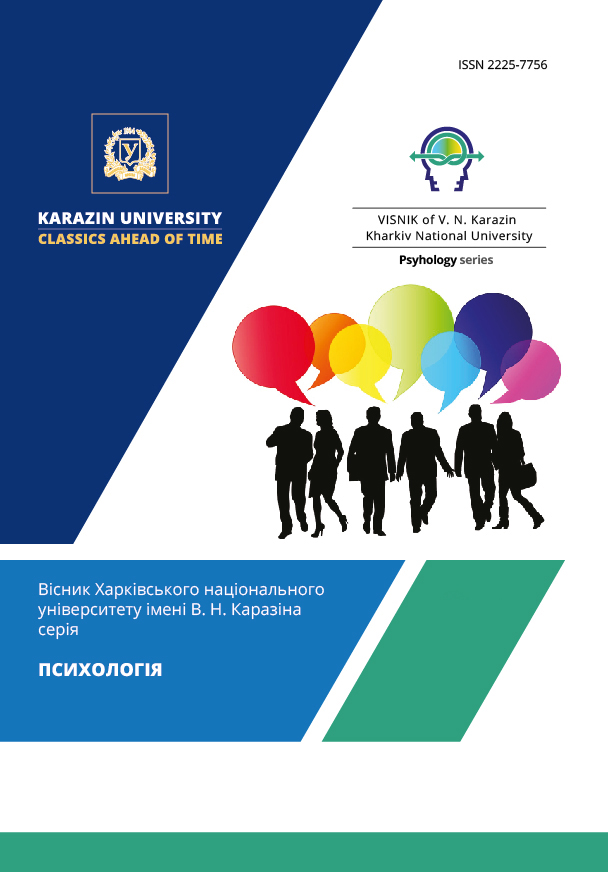The Idea of the Concept of "Love" of Young Women and Men
Abstract
The article presents the results of an empirical study devoted to the study of the peculiarities of the notion in the concept of love in young women and men. The sample consisted of 63 people aged 18 to 22. The study revealed differences in the specifics of the views of married and unmarried men, as well as established a relationship between cognitive and motivational components in married respondents. All married women are dominated by the social aspects of love as opposed to the physiological aspect. In unmarried women, social and emotional aspects predominate, while physiological aspects are important for individual subjects. Regarding self-development, this factor becomes the leading one in the mutual desire of partners and getting married does not affect this factor. The perceptions of individuals in love relationships affect the level of desirability and readiness for marriage. Marriage is one of the manifestations of feelings of love but influenced by social factors. Psychological readiness for marriage arises after a harmonious combination of partners: physiological, emotional, spiritual and social views. Married and unmarried women have a close understanding of the concept of "Love", while married and unmarried men have a distant understanding of the concept of "Love". For men, the emotional component is important, and women are focused on the social context. For unmarried women, the emotional component of love plays the greatest role. All married women are dominated by the social aspects of love as opposed to the physiological aspect. In unmarried women, social and emotional aspects predominate, while physiological aspects are important for individual subjects. Regarding self-development, this factor becomes the leading one in the mutual desire of partners and marriage does not affect this factor. The components "intimacy", "passion" and "devotion" in all samples are present and expressed at approximately the same level due to the fact that the subjects are in the same age category, and the subjects who are married have no more than one year of married life. In married samples, the idea of love is related to the cognitive and motivational component, they are guided by the mind. They dilute the concepts of emotional intimacy and sexual desire, they are not interested in the purely physiological component of sex, and they emphasize the emotional component. For unmarried samples, sex does not play a significant role in the context of love, and the cognitive component is related to the need for self-development within love. Because the subjects are members of the same social stratum and are in the same age category, they are influenced by similar social norms, and they tend to think according to certain social stereotypes. The obtained results have theoretical interest and practical significance for further research of the feeling of love in psychotherapeutic practices, for the construction of various psychological trainings.
Downloads
References
Список посилань
Екимчик, О.А. (2011). Результаты адаптации методики «Треугольная шкала любви» Р. Стернберга. Вестник Костромского гос. университета имени Н.А. Некрасова. Серия Педагогика. Психология. Социальная работа. Ювенология. Социокинетика, 17(4), 216–221.
Куликов, Л.В. (Ред.). (2009). Психология личности в трудах отечественных психологов. Санкт Петербург: Питер. https://www.twirpx.com/file/121320/
Макарова, Е.Ю. & Цветкова, Н.А. (2014). Гендерные особенности представлений о любви в юношеском возрасте. Журнал Теория и практика общественного развития, 21, 318-322. https://www.elibrary.ru/item.asp?id=23049667
Перминова, И.В. (2017). Представления о любви и удовлетворенность жизнью и браком супругов. Научно-методический электронный журнал «Концепт», 6. http://e-kon-cept.ru/2017/170133.htm.
Петровский, А.В. (1991). Трехфакторная модель значимого другого. Вопросы психологии, 1, 7-18. http://www.voppsy.ru/issues/1991/911/911007.htm
Реан, А.А. (Ред.). (2017). Психология личности в трудах зарубежных психологов. Санкт Петербург: Питер, 286. https://library.bntu.by/rean-psihologiya-lichnosti
Рибалка, В.В. (2018). Почуття любові – духовна основа гуманістичної психології та педагогіки у працях Г.І. Челпанова, Я. Корчака, В.О. Сухомлинського, І.А. Зязюна, С.Д. Максименка та інших вітчизняних і зарубіжних вчених. Рибалка, В.В., Самодрин, А.П (Ред.). Школа – духовний осередок розвитку особистості, місцевої громади та держави. К.: Талком. http://ipood.com.ua/data/NDR/Psyhology/2018_Rybalka.pdf
Сотникова, А.Ю. (2013). Безответная любовь как причина психологических расстройств у подростков. Концепт, 8, 1-8. http://e-koncept.ru/2013/13164.htm
Фрейд, З. (2016). Психология масс и анализ человеческого «Я». М.: Азбука.
Эйдемиллер, Э.Г. & Юстицкис, В.В. (2008). Психология и психотерапия семьи. Санкт Петербург: Питер. https://www.studmed.ru/view/eydemiller-eg-yustickis-v-psihologiya-i-psihoterapiya-semi_50b47ab3758.html
Эриксон, Э. (1996). Детство и общество. Санкт Петербург: Ленато, ACT.
Hendrick, S.S. (1997). Love and Satisfaction. Satisfaction in close relationships. New York: Guilford Press, 57–78.
Sternberg, R. J. (1994). Love is a story. The General Psychologist, 30(1), 111.
References
Ekimchik, O.A. (2011). The results of adaptation of the methodology "Triangular scale of love" by R. Sternberg. Vestnik Kostromskogo gos. universiteta imeni N.A. Nekrasova. Seriya Pedagogika. Psihologiya. Sotsialnaya rabota. Yuvenologiya. Sotsiokinetika, 17(4), 216–221.
Makarova, E.Yu. & Tsvetkova, N.A. (2014). Gender characteristics of ideas about love in adolescence. Zhurnal Teoriya i praktika obschestvennogo razvitiya, 21, 318-322. https://www.elibrary.ru/item.asp?id=23049667
Perminova, I.V. (2017). Ideas of love and satisfaction with life and marriage of spouses. Nauchno-metodicheskiy elektronnyiy zhurnal «Kontsept», 6. http://e-kon-cept.ru/2017/170133.htm.
Petrovskiy, A.V. (1991). Three-factor model of the significant other. Voprosyi psihologii, 1, 7-18. http://www.voppsy.ru/issues/1991/911/911007.htm
Rean, A.A. (Red.). (2017). Personality psychology in the works of foreign psychologists. Sankt Peterburg: Piter. https://library.bntu.by/rean-psihologiya-lichnosti
Kulikov, L.V. (Red.). (2009). Psychology of personality in the works of domestic psychologists. Sankt Peterburg: Piter. https://www.twirpx.com/file/121320/
Ribalka, V.V. (2018). The feeling of love is the spiritual basis of humanistic psychology and pedagogy in the works of GI Chelpanov, Y. Korchak, VO Sukhomlinsky, IA Zyazyun, SD Maksimenko and other domestic and foreign scientists. Ribalka, V.V., Samodrin, A.P (Red.). Shkola – duhovniy oseredok rozvitku osobistostі, mіstsevoyi gromadi ta derzhavi. K.: Talkom. http://ipood.com.ua/data/NDR/Psyhology/2018_Rybalka.pdf
Sotnikova, A.Yu. (2013). Unrequited love as a cause of psychological disorders in adolescents. Kontsept, 8, 1-8. http://e-koncept.ru/2013/13164.htm
Freyd, Z. (2016). Mass psychology and analysis of the human self. M.: Azbuka.
Eydemiller, E.G. & Yustitskis, V.V. (2008). Psychology and psychotherapy family. Sankt Peterburg: Piter. https://www.studmed.ru/view/eydemiller-eg-yustickis-v-psihologiya-i-psihoterapiya-semi_50b47ab3758.html
Erikson, E. (1996). Childhood and society. SPb.: Lenato, ACT.
Hendrick, S.S. (1997). Love and Satisfaction. Satisfaction in close relationships. New York: Guilford Press, 57–78.
Sternberg, R. J. (1994). Love is a story. The General Psychologist, 30 1), 111.




